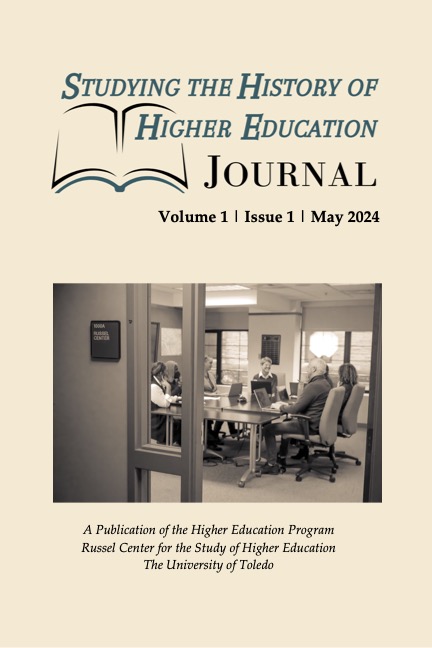A new academic journal based out of The University of Toledo’s Judith Herb College of Education is looking to the past to inform the future.
The Studying the History of Higher Education Journal, published under the auspices of the John H. Russel Center for Educational Leadership, launched its inaugural issue in May. Its mission is to offer students and emerging scholars of the history of higher education a venue to publish their research and to promote dialogue in the academic community.

The first issue of Studying the History of Higher Education Journal was published under the auspices of the John H. Russel Center for Educational Leadership in the Judith Herb College of Education.
“If we want to define our future, we need to study our past,” said Dr. Snejana Slantcheva-Durst, editor-in-chief of the journal and a professor in UToledo’s Department of Educational Studies. “There is endless wisdom and guidance in how we shape our academic programs, activities, policies, conduct and culture. For society as a whole, our universities and colleges also shape societal values and norms. Our understanding of how higher education influences our communities informs policies and practices and helps us appreciate the diverse contributions of different cultures.”
In the inaugural issue, UToledo doctoral students explore topics like Japanese language instruction at the University of Colorado Boulder in the 1940s, the experiences of racial equality activists at the Methodist Theological School in Ohio in the 1960s and the creation of the first official LGBTQ+ center at a university in the United States — at the University of Michigan — in the 1970s. Slantcheva-Durst also shares an article on the origins and evolution of UToledo’s doctoral degrees, its Higher Education Program, which hosts master’s and doctoral degree programs that prepare students to shape the future of public and private higher education in the United States, and its Russel Center for Educational Leadership.
The Russel Center functions as a research hub for the Higher Education Program.
Slantcheva-Durst anticipates the journal will be published annually, with its editorial team eager to foster a supportive environment in which novice historians at any academic institution can refine their research skills, disseminate their findings and make meaningful contributions to the field of higher education history.
She credits her own students with inspiring the creation of the Studying the History of Higher Education Journal.
“Time and again as I read through insightful, creative and inspiring archival research projects of my doctoral students, I realized what a privileged beneficiary of their interesting work I was,” said Slantcheva-Durst, who herself is a historian of higher education. “And time and again I wished I could share this privilege with others. In my search for ways to broaden the reach of my students’ excellent historical research, however, I quickly realized that academic journals for novice historians of higher education are a rarity. If we wanted to give voice to the work of budding historians, we needed to create our own conduit.”
For more information and a link to the inaugural issue, go to the Studying the History of Higher Education Journal website.